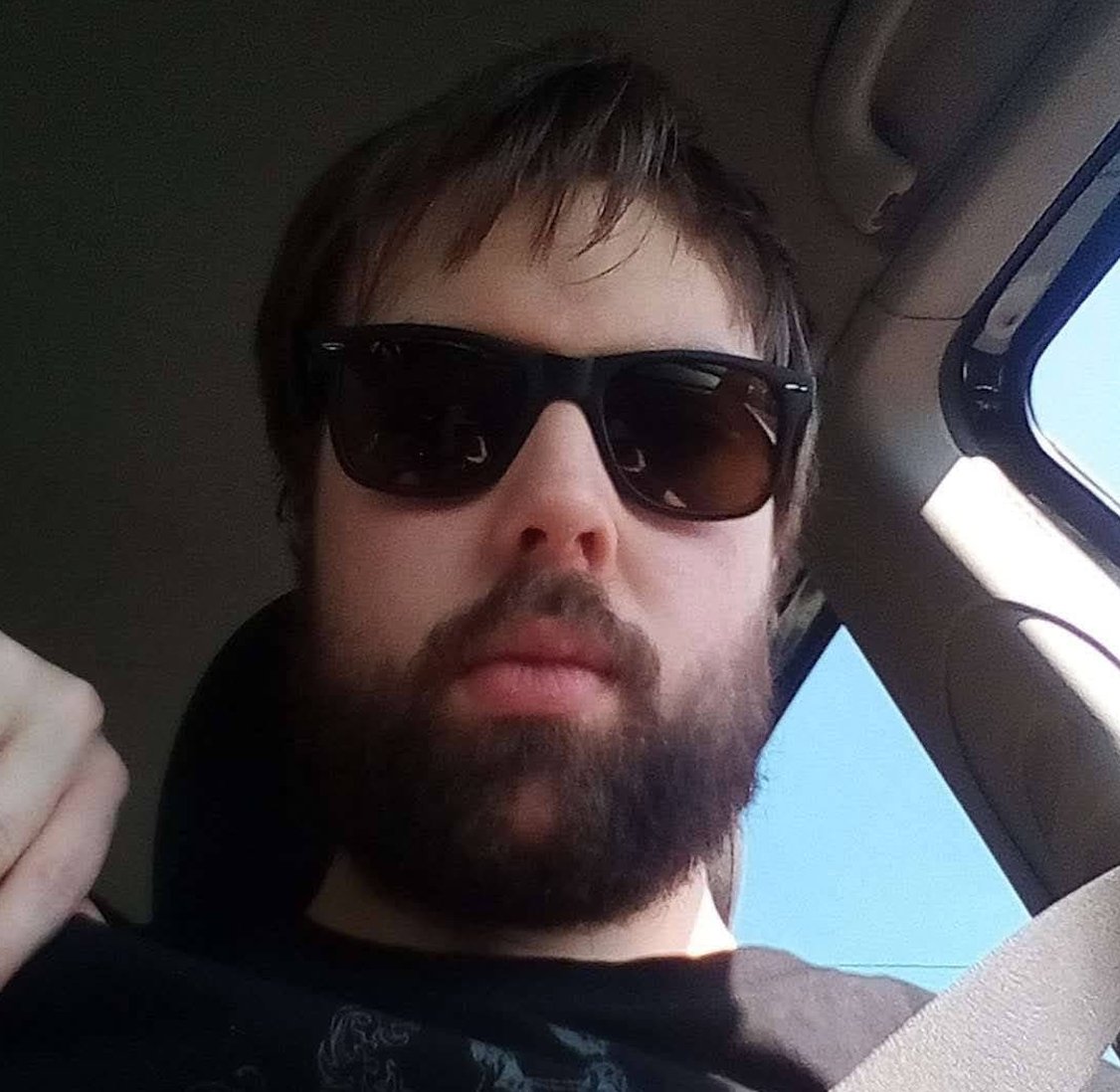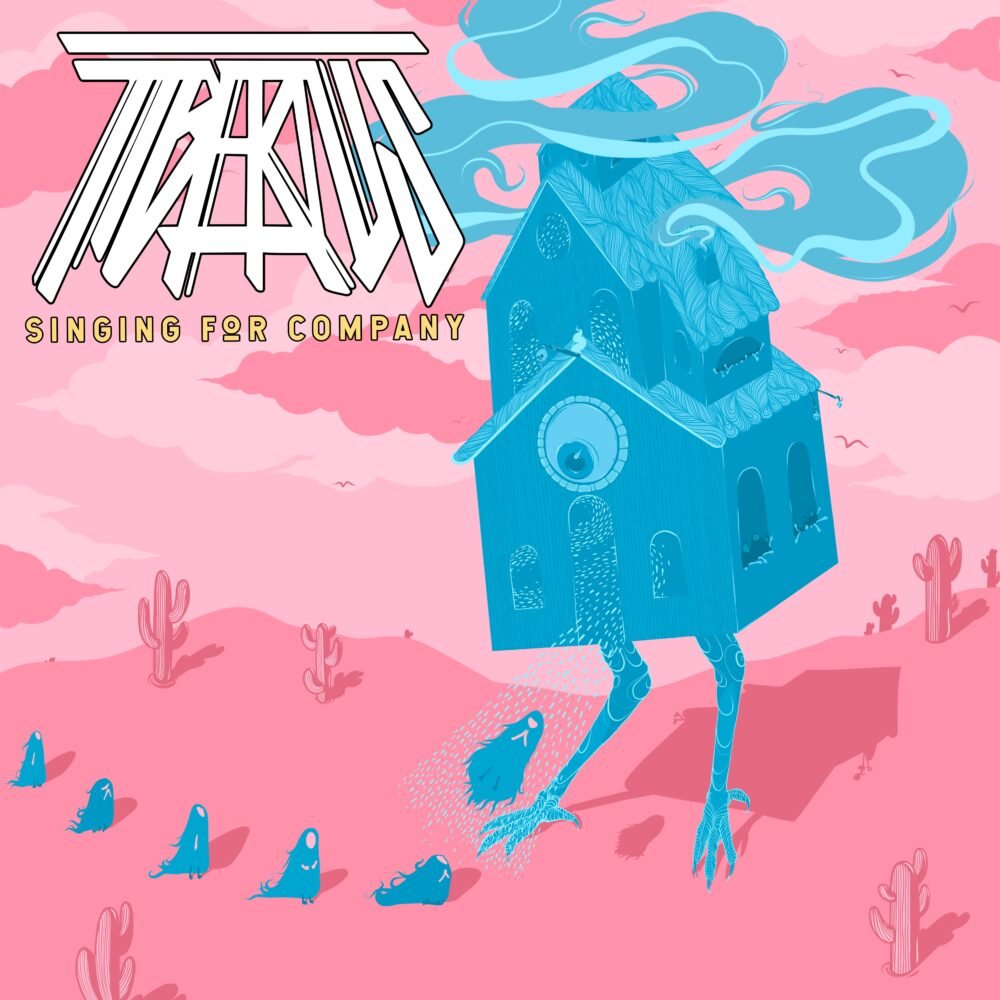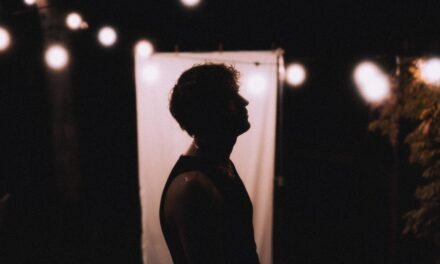TIBERIUS Talk New Album, New Single And More


Words by Glenn Sargeant
Photo Credit: Calum McMillan
Scottish angular rock crew, TIBERIUS, are back with brand new album, Singing For Company, which is out on Friday 21st March 2025. We chatted to the band about their new album, single and more:
Who is in Tiberius, what do they play and how did you meet?
Grant Barclay – Vocals
Jahan Tabrizi – Guitars
Chris Foster – Guitars
Ryan Anderson – Bass
Nick Kelly – Drums
Chris: Myself and Grant have known each other since about 2004 and were sharing a flat after I finished uni and moved back to Edinburgh. Jahan lived nearby and knew Grant through college so the three of us were already friends. Jahan and I started writing and playing music to develop our guitar playing and songwriting, and convinced Grant to join us on vocals. After a few early rhythm section changes, Ryan and Nick came on board through mutual friends and the lineup was finalised.
Grant: Me and Ryan actually bonded while at college doing music – we ended up both playing for Jon Lord, performing his Concerto for Group and Orchestra with him at the Usher Hall in Edinburgh in 2009. I think we’re both much bigger Deep Purple fans as a result.
Ryan: Yeah I crossed paths with Grant & Jahan whilst studying Music in Edinburgh. Jahan was actually a fan of a band I played in at the time, and would often be front row at shows fan-girling… So when he asked me a few years later if I’d join Tiberius I only said yes to shut him up… now he is my band Daddy… talk about a full 180.
When did you begin songwriting?
Grant: Not until quite late on, at least considering my relationship with music as a whole. As a kid I played viola, and then in high school me and Chris were in a Tenacious D covers band, so much of my early musical career was spent playing other peoples’ music. It was only when I turned 18 that I joined a hard rock band and we started writing our own music. It wasn’t good. I was scared to actually put myself and my thoughts on display so I wrote about hacky hard rock tropes and each song took no more than 5 minutes to write. Looking back I’m actually impressed at how okay they were given those parameters, but they’re still very bad!
Jahan: Technically, this is my first proper band so songwriting started real late for me. I went to music college and of course we had to write songs for exercises but they were always to a brief and never anything I felt was ‘me’. I was a huge Dream Theater/ Prog-nerd at college and I always got so obsessive about trying to write the most technical, high-brow, proggy music that it just killed the ideas before they even had a time to come out. It took me a long time to get out of that mindset and when I did, the songs started coming!
Chris: I think although we’ve all dabbled before and most of us have been playing in bands since we were in our early teens, Tiberius is the first time for most of us doing it in earnest.
What is your earliest musical memory?
Chris: I remember getting a small toy drum kit for Christmas when I was probably about 4 and deciding I wanted to play drums afterwards. By the time I went to school and they were offering music lessons, I told my parents I needed a real drum kit so I could follow my dream of being a drummer. Then they told me that drums don’t have a volume knob so I could get a guitar. So now I play guitar. Which is probably for the best, as I’m not sure Nick is tall enough to reach a fretboard.
Nick: The irony is Chris is not far off the truth! I played guitar briefly and dabbled even more briefly at bass but the reach for my fingers was too demanding. I thought I’d avoided getting RSI but then Apple released large iPhones with larger screens and RSI reared its head once again. C’est la vie. Anyway, my earliest musical memory? Arranging pots and pans on my parents’ kitchen floor and mercilessly hitting them with wooden spoons while the Beach Boys played in the background. Can’t stop a drummer. Closely followed by seeing the Red Hot Chili Peppers at Murrayfield in 2004. I remember watching Chad Smith play drums and it really blew me away seeing how somebody could make a kit sound like that live.
Ryan: I think I was about 4 years old when my parents took me to my first gig; ELO at the Playhouse! And I’ve got fairly vivid memories of the light show, watching Mik Kaminski play the violin, the whole room feeling massive and just being a bit blown away by the whole scenario.
Jahan: I don’t come from a musical family but my mum loved music. I remember when we got our first CD player and our first ever CD which was Texas’ ‘White on Blonde’ So I remember listening to that a lot. Also growing up I’d hear a lot of Iranian/Persian music so that always strikes a chord with me when I hear it somewhere.
One of your new songs is the single ‘Tip Of The Spear’ which is released on Friday 8th November 2024. What was the inspiration/story behind the track?
Grant: I suppose the main inspiration was increasing irritation with the rise of the podcaster, and in particular conservative straight white men who use the platform to grift off the backs of people who don’t know any better. In the band we sometimes try to brainstorm ideas for content (such is the life of a musician in 2024), and someone inevitably brings up the joke “you know we should do a podcast because what the world is really missing right now is two straight white men giving their opinion on things”. The term ‘Tip of the Spear’ is actually taken from Alex Jones, a right-wing conspiracy theorist and chief grifter in the US who refers to himself as such while spouting nonsense about being ‘tomorrow’s news today’. He’s an alcoholic loser that managed to channel his own self-hate into the hatred of marginalised people, which unfortunately a lot of people resonate with, and as a result built a billion dollar empire out of it. Fortunately he was recently found liable to the tune of $1.5 billion in a civil court for inciting harassment and death threats towards the families of Sandy Hook victims, so I’m sleeping a little bit better at night thinking about that.
Do you have a music video/lyric video to accompany the single? If so, what was the thought process behind it and who directed it?
Chris: There is indeed a music video to go along with it. I directed, filmed and edited it as I do with most of our videos – depending on what the concept of a video is and if I need to be in more shots, we’ll sometimes enlist other very talented videographers to help us shoot.
For Tip of the Spear – as Grant explained, the song itself is about some of the bizarre media personalities who seem to have more and more of a platform to spread nonsense these days for people to consume, so I wanted to lean into that. I’m also a big horror fan as you can tell from a lot of our videos and never want to miss an opportunity to film something gross. I thought about turning the filth coming out of some of these people’s mouths into something literal, something that’s as visually unappealing as the reality is morally. All of that resulted in poor Ryan having a pretty grim experience filming as Jahan took on his character’s persona and literally vomited his opinions right into Ryan’s face.
Your new album ‘Singing For Company’ is released on 21st March 2025. How did you want to approach the making of the album?
Grant: I guess we’ll all have different takes on this, because we didn’t sit down beforehand and really share our thoughts about what making album two would actually look like – I think we just all assumed it was happening and got on with it in our own way. From my perspective then, I wanted to make sure that the music was an evolution of our first album, but I didn’t want to pull the rug out from under people who had come to know and love our particular brand of music, so I was quite cautious about changing core elements of our sound. I appreciate when artists want to go in new directions, but I’m always much happier with incremental changes, and it can be fun to trace how a band went from sound A to sound B through their discography.
Chris: Most of our songs start off as guitar driven tracks, and then we work through vocals, lyrics and everything else as we work towards recording. For me, I feel like we did a lot of learning on our debut album around writing a cohesive song rather than a collection of cool riffs, and that’s totally evident on this second album. One thing I find works well for me when writing is trying to write a song around a story or an idea I want to get across, almost like scoring a film. I feel it makes it much more cohesive even in early instrumental form if I have a narrative to get across through the music, even if it’s only ever going to live in my brain. So I found that helpful for this album in particular.
Where did you record the album and who produced it?
Grant: We recorded the album in house. Literally, in Jahan’s house. All the vocals got recorded in a cupboard in his room with exposed pipes. We have affectionately named one of those the ‘shit pipe’. Jahan has a studio room, and that gets used to record all the guitars.
Jahan: Grant’s right, we’ve always recorded our music wherever I’ve been living and it’s given me great pleasure putting Grant in very small, duvet lined cupboards during the warmer months of the year. We then send all our music off to a grown-up in the form of Meyrick De La Fuente to handle all mixing and mastering duties.
Do you have any interesting, funny or memorable stories from the recording sessions?
Nick: you can check out a lot of our Instagram stories and posts for snippets of what we get up to during recording (hint: mostly mischief) but one memory firmly lodged in my brain is Grant almost having a breakdown when we said “this is Clem Fandago, can you hear me?” for the millionth time. Priceless. Your readers are all Matt Berry fans, right?
Grant: Yeah this is a perfect plug for our In the Studio series on our Youtube channel. Chris and Jahan decided it would be good to record a large chunk of our recording sessions, and then cut the content down to 5-10 mins videos for people to watch our descent into madness. If ever you were interested in the Tibby lore – this is the place to jump in.
Ryan: The day before I started recording bass- I was in a pretty bad road traffic accident. My wee Fiat 500 got completely wrecked and my back/neck was all messed up for a few days after. So the next day in between takes, I was just on the floor cat & cowing, each stretch producing writhing wails of pain, much to the amusement of my extremely concerned band mates.
Chris: That’s a cheery memory.
Did you use any particular instruments, microphones, recording equipment to help you get a particular sound/tone for the record?
Grant: I think almost all of our recordings have used my Sontronics Aria for capturing vocals. We just think it gives my voice a really well-balanced, warm tone compared to some of the industry-standards out there. I’m not a typical metal vocalist (in terms of cleans or growls), so it makes sense to use something out of the ordinary for a less than typical voice. On the other hand, we were a lot more experimental with instruments this time around – we outsourced parts for flamenco style classical guitar (on the track Soul Saviour) and both vocals and bagpipes (on the track Touch the Past) to try and give each song a greater sense of identity (within what otherwise might have been a homogeneous, classic Tiberius-sounding, whole).
Ryan: I’ve had my trusty Warwick Corvette 5 string with me in all our recordings (post first EP). And we usually couple it up with the Darkglass Microtubes 900v2, both live and in the studio.
Jahan: I’m a big fan of consistency when tracking so tend to use the same guitar throughout the whole process which on this occasion was my Charvel Style 2. It’s the first record we’ve put out that was’t tracked with my custom Suhr which I sold last year. We use an Apollo Twin Duo from Universal Audio so we can mimic different preamps such as an API Vision for Grant’s vocal chain and a UA-610 for our clean DI’s before they hit an amp or plugin.
Which of your new album tracks hear you at your a) happiest, b) angriest and c) most reflective?
Grant: The happiest track on the album for me is definitely Mosaic, it’s a very playful song and early draft lyrics were really silly, which I think then set the tone (at least for me). Angriest track is hard to pick, because I’m pretty angry and ranty about something in most of them! If I had to pick one it would probably be The Iliad Flow because it’s focused front and centre on the impact of late stage capitalism. Finally, and without contest, the most reflective song on the album is Touch the Past.
Chris: I mentioned having a narrative in mind when writing the initial instrumental versions of songs, so without revealing what those necessarily are, Mosaic is definitely the happiest for me.
Nick: Happiest? Mosaic. Angriest? The Iliad Flow. Most reflective? Touch the Past.
What two things do you hope to have achieved once you have left the stage?
Chris: I remember going to shows in dingy sweaty underground venues (as they all are in Edinburgh) growing up and in that situation with the band right on top of you and everyone going nuts and screaming along with the songs, the connection between everyone in the room was incredible, like nothing else existed. So, I want to achieve that connection between ourselves and everyone else in the room – I want to have removed the notion of band and audience and the weird separation and idolisation that people have of musicians and the ‘aura’ that they try to surround themselves with and for everyone to have had a unifying experience. Also, I’m over 30 so I’d like to not have thrown my back out.
Grant: It sounds a bit shitty but I want people to only be thinking about our set. I want everything else to pale by comparison – that’s how serious I am about putting on a show every time. I know it’s unrealistic/delusional, but I think it’s a healthy attitude to have when people are paying (increasingly more) money to see you perform. It’s hard for me to think of a second thing because that first thing is all-encompassing, but I’d probably have to agree with Chris and say it would be nice not to wake up with sore knees and back.
Nick: If I can end a show without my hands bleeding and shredded then that’s a victory for me. If the crowd enjoys the show then that’s a happy little accident.
Jahan: For me, playing shows is the reason I do music. I’m addicted to the rush I get. I love connecting with people through music and for me, it’s the moment before we start where I get to stand there, drink it all in that our hard work has led us to this moment. I want people to be moved, entertained and come buy merch haha!
Do you have any favoured stage instruments, effects, pedals, microphones etc?
Chris: I play Ibanez, I have a couple of modified RGA121s which I love and are an absolute workhorse for taking on tour. They’re no nonsense, reliable, play great and never give me any problems. Until recently we’ve been using Splawn Nitro amps, which sound amazing but have the unfortunate disadvantage of being heavier than your dad on Boxing day. We’ve now moved over to using the Neural DSP Quad Cortex and have been blown away by the sound and by the ease of using it and getting it around venues. Also, we can model our Splawns with it, so it’s a win-win for us.
Grant: Moving to an in-ear monitoring system has been game-changing for us. We’re a band that struggles to stay on the stage and crave chaos, and that just does not translate well to an environment where you’re also trying to hear yourself out of monitors on the stage so you’re not messing up the song. It’s been such a good quality of life improvement to have our own in-ear mixes, and we were fortunate enough to partner up with ACS to get custom moulded plugs, so it’s a really nice system that’s also to some extent bespoke.
Nick: our ACS in-ear monitors have been an absolute game changer for me and I honestly don’t think I’d ever play another show without them.
Jahan: Pretty much what the guys have said, we made the move to IEMs and they’ve been an absolute gamechanger for us. It’s also made us rethink our amp setups and we now run Quad Cortex modellers (shout-out to Max at Neural for being great) which sound incredible. Guitar wise, I have a few modded Charvels, I really love 80s superstrat style guitars that have been modded for modern playing. I just got my Charvel DK24 HT back from being repsrayed in nitro gold, having a set of Seymour Duncan Nazgul/Sentient pickups installed, glow in the dark side dots but honestly, my favourite part of this guitar is the matching headstock with the Charvel ‘toothpaste’ style logo and I can’t wait to hit the stage with it!
Where is your hometown and could you please describe it in five words?
Chris: Our hometown is Edinburgh, so ‘full of Harry Potter fans’.
Grant: I’m feeling somewhat more romantic about our fair city, so I’ll say “Gothic, dark, beautiful and mysterious”.
Nick: I’m massively missing New Zealand as I write this, so I’m going for “Cold, dark and not Aotearoa”.
Jahan: Everything is so damn expensive.
Chris: Luckily musicians only need to count to 4.
How do you look after your voices?
Grant: The number one thing I do to look after my voice is get lessons. I was a non-believer until about 5 years ago when Jahan suggested I look into it as a maintenance thing (rather than because he thought I was shit – I still don’t believe him). I think a lot of my reticence stemmed from having ‘teachers’ in the past who were really just performing artists who needed some cash on the side and knew sweet FA about how to train and fine tune a person’s voice. I have been working with my singing coach Laura on and off over the last five years, and she sets me up for success by helping me improve my technique during band down-times, and by providing my bespoke warm-ups for tour based on what I’m singing and the types of sounds I’ll be making. I warm up before every single show, and I never talk in crowded/loud rooms, as that’s an easy way to lose your voice. It does make it slightly tricky when people want to speak to me after shows, as I’m quite reluctant to get into conversations that might mess up my vocals! If you ever see me acting shifty/dodgy at a show, it’s almost certainly because of that!
Ryan: Likewise with Grant, I try to put aside as much time as possible before a show to warm up, and while it’s not quite as thorough a routine as his- I’ll do a bunch of sirens, scales, tongue twisters, a couple other exercises I learned while training to be an actor. There’s only a select few songs in our set where I’m providing backing vocals, so as long as I’ve put aside 10/15 mins before going on, it’s usually enough to save me frying my voice. A leaf I need to take out of Grant’s book is the cooling down afterwards, and not chattering away like a banshee once we’ve finished a show.
You are given the opportunity to write the score for a film adaptation of a novel that you enjoy. Which novel is it and why?
Chris: What a great question! Unfortunately Dune has already been made and I’m not sure I could do better than Zimmer. I love horror and I love Lovecraft and although there’s lots of fun Lovecraft inspired movies, I don’t think any of them have really hit or are really scary, so I’d love to have a go with ‘At the Mountains of Madness’. I think you could get really weird and experimental with it, and I also love any soundtrack where the location shines through the music and I think there’d be great opportunities for it there.
Grant: I just finished reading RF Kuang’s Poppy Wars trilogy, a grim-dark fantasy series about a character Rin who pretty much wants to set the world on fire, and I could relate to that a lot! We definitely wouldn’t be the right people to write the score though… One of the big themes of that trilogy is paying homage to her Chinese heritage. Let’s not whitewash yet another franchise.
Who are some of your musical influences? Do you have any recommendations?
Grant: My influences are very varied. Right now I’ve been listening to the new VOLA album as well as Vulkan and Electric Callboy, but those are sandwiched between Bruce Cockburn, The The, Peter Gabriel, and The Beautiful South. I’d recommend listening to all of those!
Ryan: Right now I’m big into Gunship, Dance With The Dead, Perturbator, Carpentur Brut, all that wonderful dark synthwave stuff. And one of my favourite bands that I’m always coming back to has to be Karnivool, so I recommend they please release that 4th album already, my god.
Jahan: Right now, BilMuri is my Sleep Token. That band is incredible and I’ve never needed an album like American Motor Sports in my life more than right now. Major influences for me are pretty eclectic from guitar heroes like Nuno Bettencourt, Yngwie Malmsteen and Steve Vai to bands like Health, Thrown, Protest The Hero, Coheed and Cambria and Twelve Foot Ninja.
Do you have any live dates planned in the UK/Europe in 2024/2025?
We’ve just been announced for RADAR Festival 2025 which we’re super excited for. We have a handful of UK shows booked for Spring 2025 to celebrate the release of our album which will be announced before the end of the year and we’re also in talks with a few places in Europe too so stay tuned!
Who created/designed the album artwork?
Grant: Our mother hen and general band wrangler Alex Spencer is the talented human that designed the album artwork. The creature on the front is based on the Baba Yaga from Slavic folklore, which is depicted on our album consuming wayward souls who seem to revere it, thinking it’s their salvation and not their damnation. I’d say she hit the nail on the head in terms of interpreting my lyrics!
Chris: Alex has designed all our releases going back to the first EP, and most of our merch (with the rest being the equally talented Sophie Bellingham who is also a tattoo artist up in Edinburgh). I think this album cover is a big departure from some of the previous work in the best way, but still shares a lot of the same stuff that made the previous release’s covers so amazing. We get a lot of comments from people appreciating the artwork which is nice, and it’s something we take really seriously when planning a release making sure the whole package is the best we can make it.
Was it a difficult album to write?
Grant: I’d say it was. The whole process started at a really difficult time, both personally and generally speaking as it was not long after the pandemic broke out. It feels a bit cliche to be talking about problems associated with the pandemic, but it’s just the truth. It was sometimes hard to be motivated to do anything, nevermind write an album that we may never get to tour, and our lives were changed quite profoundly overnight, so we got into and out of certain habits that, at least for me personally, made it harder for me to focus on things like lyric writing. It took me a long time to write some of the lyrics for this album, and so that caused problems holding everything else up. I really have to thank the guys for helping me and always staying supportive – they were always brainstorming ways to try and encourage productivity, and there was much more outside influence in terms of direction of melody and lyrics in this album as a result. I think for the better.
Jahan: I’ll be honest, it was incredibly hard. I think we all came out of covid burned out. We were caged up like battery hens with no real life experiences or inspiration to draw from. I didn’t want to be another band coming out of this and writing songs about the pandemic. I wanted to write music inspired by bands I’d watched live, or people I’d met or places I had been, all of which there was none of. The raw tracks took a long time to arrange to get to a place where we felt they were coherent songs but I can confidently say that the agonising process of working through them made us all better songwriters and the songs are better for it.
What makes TIBERIUS happy and what makes you unhappy?
Grant: At the risk of being accused of virtue signalling, equality and fairness make me happy, and discrimination and injustice make me very unhappy. All of our songs are about these themes. As a result I’m also happy when I’m on stage sharing these feelings with people in the audience.
Jahan: Happiness for me is family, friends, music and food. Unhappy is pretty much everything going on outside that I have no control over which at the moment feels like everything beyond arm’s length.

Feature Image Photo Credit: Calum McMillan
TIBERIUS’s new single ‘Tip Of The Spear’ is released on Friday 8th November 2024.
Pre-Save Here: https://distrokid.com/hyperfollow/tiberius/tip-of-the-spear-2
Their new album ‘Singing For Company’ will be released on Friday 21st March 2025.
Official Linktree: https://linktr.ee/tiberiusuk
In addition, the band have also been announce for RADAR Festival 2025 which will take place between 4th – 6th July 2025 at 02 Victoria Warehouse, Manchester, United Kingdom. For tickets and more information visit: https://www.radarfestival.co.uk/




